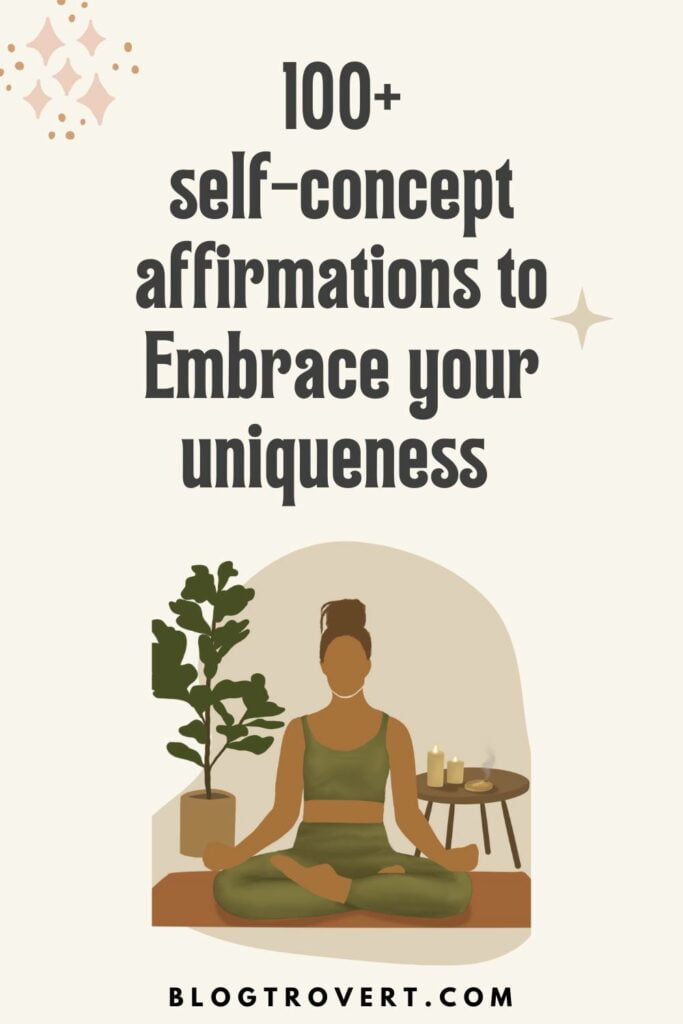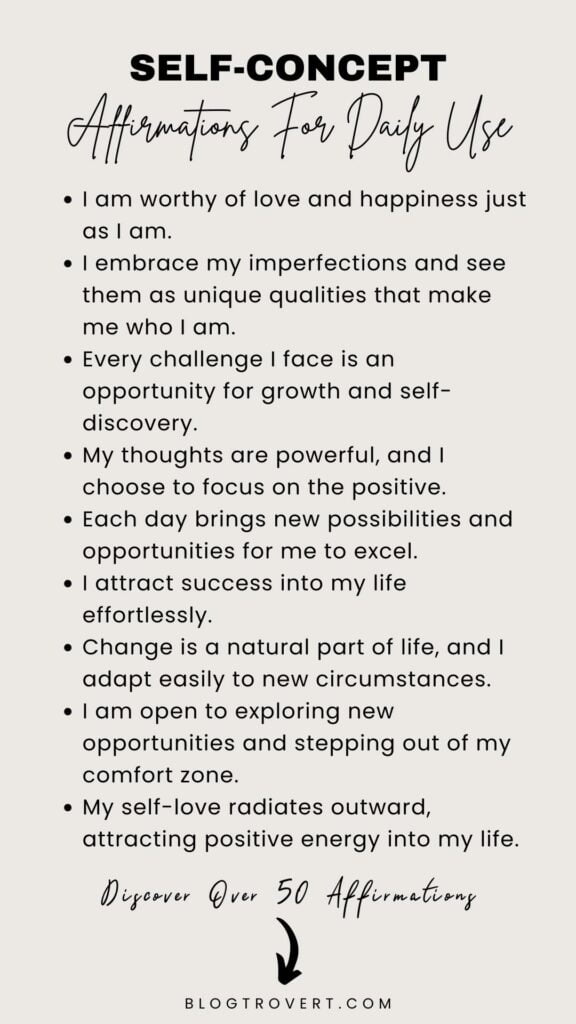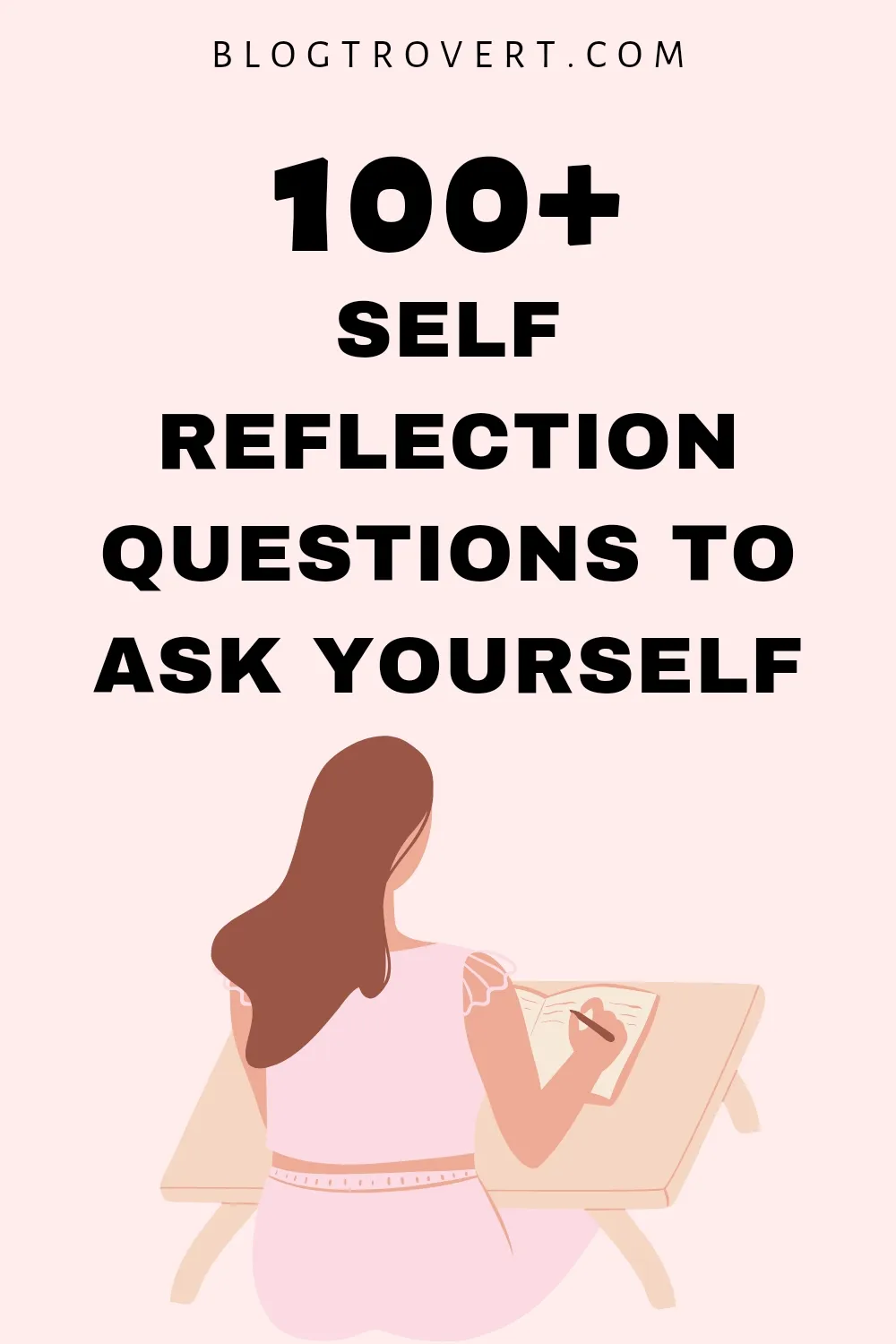As humans, we often struggle with self-doubt and negative self-talk, which can have a significant impact on how we see ourselves and life.
Our self-concept refers to the collection of beliefs and attitudes we have about ourselves and our abilities. Our experiences, relationships, and personal beliefs shape our self-concept.

When we have a positive self-concept, we feel confident, capable, and worthy of love and respect. But a negative self-concept can pull us down the rabbit hole of low self-esteem, anxiety, and insecurity.
Benefits of Daily Self-Concept Affirmations
Daily self-concept affirmations can be a powerful tool to combat negative self-talk and boost how we perceive ourselves. But then, they yield remarkable benefits that extend beyond mere positive thinking.
Practicing self-concept affirmations can work wonders in enhancing your confidence, nurturing a positive self-image, fostering self-acceptance, and cultivating self-love.
They can help you break away from negative self-talk and overcome limiting beliefs that hold you back from reaching your full potential. They have the power to instill a growth mindset, propelling you toward personal development.
When you repeat positive statements about yourself, you internalize them and believe in them more and more each day. This shift in mindset creates a ripple effect in all areas of your lives, from your relationships and career to your physical and mental health. You become more resilient in the face of challenges and open to new opportunities, the ultimate essence of a fulfilling life.
In this blog post, we’ll explore the wonderful world of daily self-concept affirmations to boost self-confidence, enhance self-esteem, and cultivate a strong and positive self-concept.
Ready to embark on this empowering journey?
Let’s dive right in!
150 self-concept affirmations
- Embracing Self-Acceptance
- I am worthy of love and happiness just as I am.
- I embrace my imperfections and see them as unique qualities that make me who I am.
- Every challenge I face is an opportunity for growth and self-discovery.
- Cultivating a Positive Mindset
- My thoughts are powerful, and I choose to focus on the positive.
- Each day brings new possibilities and opportunities for me to excel.
- I attract success into my life effortlessly.
- Embracing Change
- Change is a natural part of life, and I adapt easily to new circumstances.
- I am open to exploring new opportunities and stepping out of my comfort zone.
- Each day, I become a better version of myself.
- Self-concept affirmations for love
- I love and accept myself unconditionally.
- I prioritize my well-being and practice self-care daily.
- My self-love radiates outward, attracting positive energy into my life.
- Celebrating Strengths
- I acknowledge and appreciate my unique talents and abilities.
- I have the power to overcome any obstacles that come in my way.
- Each day, I grow stronger mentally, emotionally, and physically.
- Affirming Personal Worth
- I am deserving of all the good things that come my way.
- I am enough, just as I am.
- My worth is not determined by external validation but by the love and respect I have for myself.
- Building Resilience
- I have the strength and resilience to bounce back from any setbacks I encounter.
- Challenges are opportunities for growth and learning.
- I am stronger than I think, and I can handle whatever comes my way.
- Fostering Gratitude
- I am grateful for the abundance of blessings in my life.
- Each day, I find joy in the simple pleasures that surround me.
- I attract positivity into my life by expressing gratitude daily.
- Releasing Self-Doubt
- I release all self-doubt and embrace my limitless potential.
- I trust in my abilities to navigate any situation with grace and ease.
- I believe in myself and my unique gifts.
- Self-concept affirmations for Manifesting Success
- I am a magnet for success, and abundance flows effortlessly into my life.
- I have the power and determination to achieve my goals.
- I am open to receiving all the wonderful opportunities the universe has in store for me.
- Encouraging Authenticity
- I love and accept myself fully, embracing and expressing my true self.
- I value authenticity and honor my personal boundaries.
- By being true to myself, I inspire others to do the same.
- Cultivating Inner Peace
- I am at peace with myself and the world around me.
- I release all negative emotions and fill my heart with love and tranquility.
- I radiate peace and positivity in all that I do.
- Attracting Positive Relationships
- I am surrounded by loving and supportive individuals who uplift and inspire me.
- I attract healthy and fulfilling relationships into my life.
- I deserve love and nurture relationships that bring out the best in me.
- Embracing Self-Forgiveness
- I forgive myself for past mistakes and embrace the lessons they have taught me.
- I deserve to be happy and free from the burden of past regrets.
- Each day is a new opportunity for me to grow and develop.
- Honoring Personal Boundaries
- I respect and honor my personal boundaries, allowing me to prioritize my well-being.
- It is okay for me to say no when something doesn’t align with my values or goals.
- By setting clear boundaries, I create a healthy and balanced life.
- Unleashing Creativity
- I am a vessel of infinite creativity, and my ideas flow effortlessly.
- I express my creativity freely and fearlessly.
- Each day, I tap into my creative potential and unlock new possibilities.
- Trusting Intuition
- I trust my inner wisdom to guide me in making the right decisions.
- The answers I seek are within me, and I listen to my intuition with unwavering faith.
- My intuition is a reliable compass that leads me towards my highest good.
- Embracing Self-Reflection
- I take time for self-reflection and learn from my experiences.
- I grow wiser and more insightful with each passing day.
- Self-reflection allows me to make positive changes and align with my true purpose.
- Radiating Confidence
- I am confident in my abilities and trust in my capacity to succeed.
- I hold my head high, knowing that I am capable of greatness.
- Confidence is my superpower, and it empowers me to conquer any challenge.
- Releasing Limiting Beliefs
- I let go of all limiting beliefs that no longer serve me.
- I am limitless in my potential and capable of achieving anything I set my mind to.
- My beliefs shape my reality, and I choose to believe in my extraordinary capabilities.
- Embracing Self-Appreciation
- I appreciate and celebrate my accomplishments, no matter how big or small.
- I give myself credit for the progress I’ve made on my journey of self-growth.
- Self-appreciation fuels my motivation and inspires me to reach new heights.
- Practicing Emotional Resilience
- I am in control of my emotions, and I choose to respond with resilience and grace.
- I embrace my emotions and learn valuable lessons from them.
- Emotional resilience is my power to thrive in any situation.
- Prioritizing Self-Compassion
- I show kindness and compassion to myself in times of struggle.
- I treat myself with the same love and understanding I would give to a dear friend.
- Self-compassion is the foundation of my emotional well-being.
- Inviting Abundance
- I attract abundance in all areas of my life, including love, wealth, and opportunities.
- The universe conspires to bring me everything I desire and more.
- I am open to receiving the abundance that is rightfully mine.
- Self-Concept Affirmations for Practicing Mindfulness
- I fully embrace the present moment and find joy in the simple pleasures of life.
- Mindfulness allows me to appreciate the beauty that surrounds me.
- By being present, I create a life of clarity and fulfillment.
- Inspiring Empowerment
- I am a source of inspiration and empowerment to those around me.
- My words and actions have the power to positively impact others’ lives.
- By embracing my own power, I encourage others to do the same.
- Embracing Authentic Self-Care
- I prioritize self-care as a vital component of my overall well-being.
- I nurture my mind, body, and soul with love and care.
- Authentic self-care allows me to show up fully in all areas of my life.
- Letting go of Comparison
- I release the need to compare myself to others.
- I celebrate my unique journey and focus on my progress.
- Each person is on their own path, and I honor mine.
- Attracting Abundant Health
- I am in perfect health, both mentally and physically.
- I make conscious choices that support my overall well-being.
- Vibrant health is my birthright, and I embrace it fully.
- Self-Concept Affirmations or Emotional Balance
- I am in control of my emotions and choose to cultivate an emotional balance.
- I embrace both positive and negative emotions as part of my human experience.
- Emotional balance allows me to navigate life with grace and resilience.
- Self-Concept Affirmations for Nurturing Inner Child
- I embrace my inner child, allowing myself to play, dream, and have fun.
- I give myself permission to let go of seriousness and explore life with a sense of wonder and curiosity.
- Connecting with my inner child brings joy and lightness into my life.
- Self-Concept Affirmations for Invoking Courage
- I am brave and courageous in the face of fear.
- I take bold actions that align with my goals and dreams.
- Courage is the fuel that propels me towards greatness.
- Self-concept money affirmations for attracting Financial Abundance
- I attract wealth and financial abundance effortlessly.
- Money flows freely into my life, supporting me in fulfilling my dreams and desires.
- I am a magnet for opportunities that lead to financial prosperity.
- Cultivating Healthy Boundaries
- I set healthy boundaries in my relationships, ensuring mutual respect and support.
- I prioritize my emotional well-being by establishing clear boundaries.
- Healthy boundaries create deeper connections and harmonious relationships.
- Self-Concept Affirmations for Embracing Resilience
- I am resilient, and I bounce back stronger from life’s challenges.
- I transform adversity into growth and embrace the lessons it brings.
- My resilience knows no bounds, and I continue to thrive despite any obstacles.
- Self-Concept Affirmations for Trusting Divine Timing
- I trust that everything unfolds in the perfect time and way for my highest good.
- The universe has a divine plan for me, and I surrender to its guidance.
- Divine timing aligns me with the limitless opportunities that await.
- Inviting Forgiveness
- I forgive myself and others, releasing any resentment or negativity.
- Forgiveness frees me from the chains of the past and creates space for love and healing.
- Through forgiveness, I cultivate inner peace and harmony.
- Self-Concept Affirmations for Promoting Healthy Self-Talk
- I speak to myself with kindness, love, and encouragement.
- Positive self-talk fuels my self-belief and enhances my confidence.
- My inner dialogue is uplifting and empowering.
- Nurturing Patience
- I embrace patience as a virtue that leads me towards my goals.
- I trust that everything is unfolding in divine timing.
- Patience allows me to savor the journey and appreciate the process.
- Embracing Authenticity
- I am authentic and true to myself in all situations.
- I express my thoughts and emotions honestly and openly.
- Authenticity is my superpower, and it attracts genuine connections and opportunities.
- Cultivating Mental Clarity
- My mind is clear, focused, and capable of solving any challenges that come my way.
- I release mental clutter and invite clarity and insight into my life.
- Mental clarity allows me to make informed decisions and take aligned actions.
- Embracing Independence
- I am independent and capable of accomplishing great things on my own.
- I trust in my abilities to navigate life with independence and confidence.
- Independence empowers me to create the life I desire.
- Self-Concept Affirmations for Joy
- I choose joy as my guiding principle, and I invite it into every aspect of my life.
- I find joy in simple pleasures and celebrate life’s moments, big and small.
- Joy is my birthright, and I embrace it fully.
- Fostering Lifelong Learning
- I am a lifelong learner, continuously growing and expanding my knowledge.
- I seek new opportunities for growth and challenge myself to learn and improve.
- Lifelong learning is my gateway to personal development and self-mastery.
- Connecting with Nature
- I connect with nature and find solace in its beauty.
- The natural world enriches my soul and provides me with a deep sense of gratitude.
- Nature rejuvenates and inspires me on my journey of self-discovery.
- Invoking Inner Strength
- I possess unwavering inner strength that guides me through life’s ups and downs.
- I am resilient and capable of overcoming any obstacles.
- Inner strength is my constant companion on my path to success.
- Cultivating Abundant Mindset
- I am a co-creator with the universe, and I deserve abundance in all areas of my life.
- I focus on abundance, and scarcity has no place in my mindset.
- An abundant mindset opens doors to limitless possibilities.
- Self-Concept Affirmations for Embracing Vulnerability
- I embrace vulnerability as a strength and allow myself to be seen authentically.
- Vulnerability creates deeper connections and fosters personal growth.
- By embracing vulnerability, I cultivate courage and resilience.
- Practicing Self-Reflection
- I take time each day to reflect on my thoughts, actions, and intentions.
- Self-reflection allows me to grow and evolve on my journey of self-discovery.
- Through self-reflection, I gain valuable insights and make positive changes.
- Self-Concept Affirmations for Celebrating Self-Concept Growth
- I celebrate my personal growth and milestones along my self-concept journey.
- Each day, I become more self-aware and nurture my self-concept.
- I am proud of the person I am becoming and excited for my future.

How to Practice Self-Concept Affirmations
- Create an affirmation routine that allows you to establish a consistent practice that reinforces your self-concept.
- Find the right time and place for affirmations, so that you can create a conducive environment that maximizes their impact.
- Combine affirmations with visualization and meditation techniques to enhance their effectiveness. This allows you to internalize the positive beliefs you seek to cultivate.
- Employ effective writing and repetition strategies to amplify the potency of affirmations. This can make them a powerful tool for self-transformation.
Conclusion
Daily self-concept affirmations have the potential to revolutionize your mindset, boost your confidence, and foster personal growth.
When you embrace your uniqueness, nurture self-love, and develop a positive self-image, you open yourself up to a world of possibilities.
Through incorporating affirmations into your daily routines, you can harness the power of positive self-talk and shape your life with intention.
So embark on this journey of self-discovery, embrace the daily self-concept affirmations provided, and witness the remarkable transformation that unfolds within you.
Remember, you have the power to define and elevate your self-concept, and by doing so, you pave the way for a life of fulfillment and authenticity.
Remember to repeat these affirmations with genuine belief, and watch as your self-confidence, self-esteem, and overall well-being flourish.
You are worthy of love, happiness, and success!
Keep shining!




